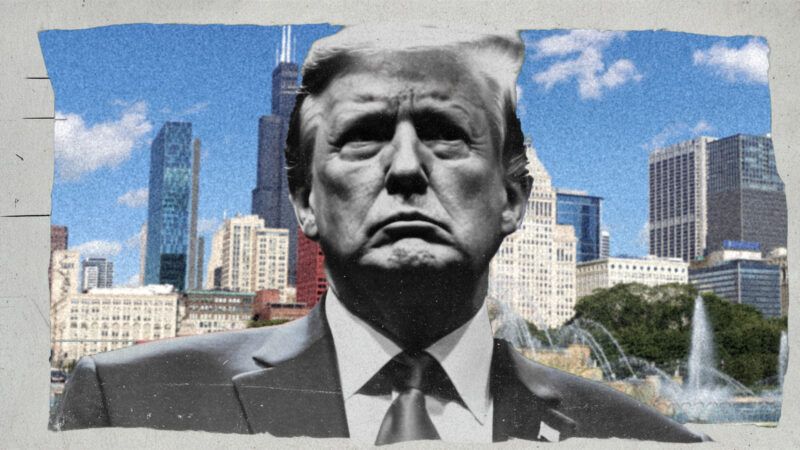On National Guard Deployments, Trump Tells SCOTUS His Power Is 'Unreviewable'
Will the Supreme Court grant Trump the overwhelming judicial deference he demands?

Federal law says the president of the United States may only call state National Guard members "into Federal service" when certain specific conditions are met, such as when "there is a rebellion or danger of rebellion against" the federal government, or when "the President is unable with the regular forces to execute the laws of the United States."
According to President Donald Trump, he alone gets to decide when or if such conditions exist. Or, as Trump recently argued in a legal filing to the U.S. Supreme Court, "such decisions are committed to the discretion of the President and are unreviewable" by the federal courts.
You’re reading Injustice System from Damon Root and Reason. Get more of Damon’s commentary on constitutional law and American history.
This particular claim of "unreviewable" executive discretion came in Trump v. Illinois, the case arising from Trump's immigration crackdown in the greater Chicago area. On October 9, Judge April Perry of the U.S. District Court for the Northern District of Illinois found that Trump's federalization and deployment of state National Guard members in Chicago failed to satisfy the requirements of federal law because there was no rebellion and because the execution of federal law was not being prevented.
Then, on October 16, the U.S. Court of Appeals for the 7th Circuit mostly affirmed Perry's order. "Even giving substantial deference to [Trump's] assertions," the 7th Circuit said, Trump's claim that an actual rebellion against the federal government was unfolding in Chicago did not withstand judicial scrutiny. Furthermore, the court stated, "there is insufficient evidence that protest activity in Illinois has significantly impeded the ability of federal officers to execute federal immigration laws."
As a result, the 7th Circuit left in place the district court order barring Trump from deploying the federalized National Guard forces in Chicago. For those keeping score at home, the unanimous three-judge panel that issued this ruling included Judge Amy St. Eve, who was appointed to the 7th Circuit by Trump.
Which brings us back to SCOTUS. In an emergency filing on October 17, the Trump administration urged the Supreme Court to void the 7th Circuit's order and allow the federalized National Guard deployment to proceed in the Windy City. "The President's decision whether to federalize the Guard," the Trump administration told the Court, "is not subject to second-guessing by the State of Illinois or a federal district court."
As a supposed authority for this claim of unfettered executive discretion, the Trump administration pointed to the Supreme Court's 1827 decision in Martin v. Mott. Yet the 7th Circuit reviewed that same ruling and found that it offered no support for Trump's position.
In a recent guest post at The Volokh Conspiracy, law professors Joshua Braver and John Dehn offered a detailed look at Martin v. Mott that explained why the case is no help to Trump. As they point out, Martin did not involve any question about the proper use of the military in particular situations. Rather, the case dealt with events that occurred during the War of 1812, a declared war in which British forces had literally invaded the U.S. There was thus no question in Martin about whether sufficient conditions existed for the president to call forth state forces into federal service.
By contrast, in Trump v. Illinois, the overriding question is whether the requisite conditions (such as "rebellion") even exist in Chicago at all. In other words, Trump v. Illinois asks the federal courts to look at a federal statute and determine whether or not Trump's assertions can be reconciled with the specific requirements imposed by the statute's text. Meanwhile, the Trump administration maintains that the president's assertions in the case deserve to be entirely shielded from judicial review.
The question now is whether the Supreme Court will submit to the terms of judicial surrender that have been proposed by Trump. We'll see.
